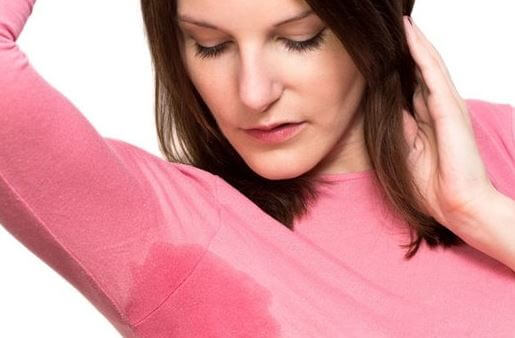Sweating too Much? Here's what you Should Do

Sweating excessively can be pretty uncomfortable and even more so if you’re on a date or at a public event with all eyes on you. In these situations, self-conscious thoughts about personal appearance that break down self-esteem are all too common.
Perspiration is a normal body reaction to heat that aims to regulate body temperature. The body releases liquid from sweat glands in the armpits, hands, feet, and forehead to cool down.
Sweating in the sun is completely normal. In the summer, while walking on the beach or playing a sport, sweating is a good response from a healthy body.
But, some circumstances can lead people to sweat excessively. Some even have conditions such as hyperhidrosis.
Sweating: what is hyperhidrosis?
Hyperhidrosis is a condition in which a person sweats excessively without an apparent cause. Abnormally active sweat glands produce an uncontrollable amount of perspiration, which can lead to discomfort.
This condition is associated with introverted personality types who are are outwardly shy in their social relationships. There are two types of hyperhidrosis.
- Primary, or focal, hyperhidrosis: primary hyperhidrosis causes uncontrollable sweating in hands, feet, and armpits–with no apparent motive. It’s associated with states of physiological anxiety that result from emotional changes such as fear. It’s also possible that the condition is hereditary.
- Secondary, or generalized, hyperhidrosis: excessive sweat production as a result of medical or pathological causes that can appear throughout the entire body. It’s a big symptom in hormonal conditions such as hyperthyroidism. It also appears in menopause and obesity. People with brain or central nervous disorders may also show the symptom.

When is excessive sweating normal?
People tend to perspire more than normal when their emotions run high. The body interprets the signals of fear or anxiety and generates more sweat to internally regulate the body.
The main problem is that people become stressed when trying a number of things to stay dry: higher stress levels mean more sweat. These situations create a cyclical conflict. Excessively sweating affects self-esteem and quality of life, and the people experiencing the consequences often try to avoid social contact.
Or, when the body has a low glucose level, it can also start sweating excessively. It manifests as a common symptom caused by internal imbalance, alongside digestive problems with certain foods.
Adding on to all of this, hormonal alterations such as pregnancy or menopause can also produce excessive sweating. It’s especially prone to happen because a higher internal temperature, which is the result of the changes in the endocrine system. All of this leads the body to self-regulate by perspiring more.
How can you treat sweating and hyperhidrosis?
Fortunately, there are different medical treatments that can help you treat this condition. The most common are oral and topical solutions.
People also turn to alternative treatments such as Botox and electric shocks. In certain cases, surgical intervention can also be an option to remove some of the sweat glands.
Any medical treatment implies health risks. In light of this, the most appropriate treatment options should be reviewed over time and by experts to suit an individual’s case.

Home remedies
Using comfortable, light clothing and accessories is always a big help to prevent the body from overheating. Some fabrics, such as cotton, are designed to help you stay cool.
You can also use antiperspirants to keep your body dry for several hours. Additionally, avoid products such as coffee, tobacco, and excessively spicy foods.
If you have sweaty hands, soaking them in vinegar water for 10 minutes two times a day will help. Lastly, consider exercises that help regulate body temperatures while helping the body relax.
Sweating excessively can be pretty uncomfortable and even more so if you’re on a date or at a public event with all eyes on you. In these situations, self-conscious thoughts about personal appearance that break down self-esteem are all too common.
Perspiration is a normal body reaction to heat that aims to regulate body temperature. The body releases liquid from sweat glands in the armpits, hands, feet, and forehead to cool down.
Sweating in the sun is completely normal. In the summer, while walking on the beach or playing a sport, sweating is a good response from a healthy body.
But, some circumstances can lead people to sweat excessively. Some even have conditions such as hyperhidrosis.
Sweating: what is hyperhidrosis?
Hyperhidrosis is a condition in which a person sweats excessively without an apparent cause. Abnormally active sweat glands produce an uncontrollable amount of perspiration, which can lead to discomfort.
This condition is associated with introverted personality types who are are outwardly shy in their social relationships. There are two types of hyperhidrosis.
- Primary, or focal, hyperhidrosis: primary hyperhidrosis causes uncontrollable sweating in hands, feet, and armpits–with no apparent motive. It’s associated with states of physiological anxiety that result from emotional changes such as fear. It’s also possible that the condition is hereditary.
- Secondary, or generalized, hyperhidrosis: excessive sweat production as a result of medical or pathological causes that can appear throughout the entire body. It’s a big symptom in hormonal conditions such as hyperthyroidism. It also appears in menopause and obesity. People with brain or central nervous disorders may also show the symptom.

When is excessive sweating normal?
People tend to perspire more than normal when their emotions run high. The body interprets the signals of fear or anxiety and generates more sweat to internally regulate the body.
The main problem is that people become stressed when trying a number of things to stay dry: higher stress levels mean more sweat. These situations create a cyclical conflict. Excessively sweating affects self-esteem and quality of life, and the people experiencing the consequences often try to avoid social contact.
Or, when the body has a low glucose level, it can also start sweating excessively. It manifests as a common symptom caused by internal imbalance, alongside digestive problems with certain foods.
Adding on to all of this, hormonal alterations such as pregnancy or menopause can also produce excessive sweating. It’s especially prone to happen because a higher internal temperature, which is the result of the changes in the endocrine system. All of this leads the body to self-regulate by perspiring more.
How can you treat sweating and hyperhidrosis?
Fortunately, there are different medical treatments that can help you treat this condition. The most common are oral and topical solutions.
People also turn to alternative treatments such as Botox and electric shocks. In certain cases, surgical intervention can also be an option to remove some of the sweat glands.
Any medical treatment implies health risks. In light of this, the most appropriate treatment options should be reviewed over time and by experts to suit an individual’s case.

Home remedies
Using comfortable, light clothing and accessories is always a big help to prevent the body from overheating. Some fabrics, such as cotton, are designed to help you stay cool.
You can also use antiperspirants to keep your body dry for several hours. Additionally, avoid products such as coffee, tobacco, and excessively spicy foods.
If you have sweaty hands, soaking them in vinegar water for 10 minutes two times a day will help. Lastly, consider exercises that help regulate body temperatures while helping the body relax.
All cited sources were thoroughly reviewed by our team to ensure their quality, reliability, currency, and validity. The bibliography of this article was considered reliable and of academic or scientific accuracy.
- Sociedad Española de Medicina de Familia. 2016. Sudoración excesiva. Extraído de: https://www.semfyc.es/wp-content/uploads/2016/07/12_14.pdf
- D. González Fernández, N. Pérez Oliva. 2012. Actualización en hiperhidrosis focal primaria. Extraído de: http://www.medigraphic.com/pdfs/cutanea/mc-2012/mc126b.pdf
This text is provided for informational purposes only and does not replace consultation with a professional. If in doubt, consult your specialist.








